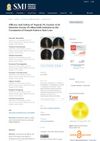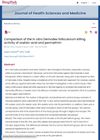Azelaic Acid
🛒 Where to find Azelaic Acid
Tracking 13 topical products by companies like MV supplements , Manual and Minoxidil Express. View all 13 products »Azelaic acid is a naturally occurring dicarboxylic acid found in grains like wheat, rye, and barley. It's primarily known for its use in dermatology, particularly in treating mild to moderate acne and rosacea. Azelaic acid has antimicrobial and anti-inflammatory properties, making it effective in reducing skin bacteria, inflammation, and keratin buildup that can lead to acne. Its utility extends beyond these conditions, gaining interest for its potential role in hair loss treatment.
In the context of hair loss, azelaic acid's mechanism of action is believed to involve the inhibition of the enzyme 5-alpha-reductase. This enzyme converts testosterone into dihydrotestosterone (DHT), a hormone that plays a crucial role in androgenetic alopecia, a common form of hair loss. By potentially reducing DHT levels, azelaic acid may help minimize its detrimental effects on hair follicles, which include miniaturization and subsequent hair thinning and loss. Studies have also explored its role in promoting hair growth and improving hair density, often comparing it with established treatments like minoxidil.
Additionally, azelaic acid's antioxidant properties contribute to its therapeutic potential. It helps combat oxidative stress, a factor that can exacerbate hair loss. This multi-faceted approach to addressing hair loss at both hormonal and cellular levels makes azelaic acid an intriguing component in hair loss prevention and treatment strategies.
In the community, discussions about azelaic acid often revolve around its effectiveness when used in combination with other treatments like minoxidil and tretinoin. Users share their experiences with products containing azelaic acid, noting its benefits in hair regrowth and scalp health. While some users question the extent of its efficacy as a standalone treatment for hair loss, others view it as a valuable addition to their hair care regimen, particularly for its perceived safety and tolerability.
Research
20 / 318 resultsresearch The Versatility of Azelaic Acid in Dermatology

research Comparison of Azelaic Acid and Anthralin for the Therapy of Patchy Alopecia Areata

research Azelaic Acid in the Treatment of Acne in Adult Females: Case Reports

research BCL-2 and Bax Expression in Skin Flaps Treated with Finasteride or Azelaic Acid
research Comparative Study of Efficacy of Topical Minoxidil 5% and Combination of Topical Minoxidil 5%, Topical Azelaic Acid 1.5% and Topical Tretinoin 0.01% Based on Dermoscopic Analysis in Androgenetic Alopecia

research Azelaic Acid Stimulates Catalase Activation and Promotes Hair Growth Through Upregulation of Gli1 and Gli2 mRNA and Shh Protein
research Comparative Study of Efficacy of Topical Minoxidil 5% and Combination of Topical Minoxidil 5%, Topical Azelaic Acid 1.5% and Topical Tretinoin 0.01% Based on Dermoscopic Analysis in Androgenetic Alopecia

research The Pathogenesis of Acne: How Might Azelaic Acid Act?

research Hair Follicle-Targeted Delivery of Azelaic Acid Micro/Nanocrystals Promotes the Treatment of Acne Vulgaris

research Efficacy and Safety of Topical 5% Azelaic Acid Solution Versus 2% Minoxidil Solution in the Treatment of Female Pattern Hair Loss

research The Multiple Uses of Azelaic Acid in Dermatology: Mechanism of Action, Preparations, and Potential Therapeutic Applications

research The Efficacy of Azelaic Acid 20% Cream in the Treatment of Scalp Alopecia Areata

research The Efficacy of Azelaic Acid 20% Cream in the Treatment of Scalp Alopecia Areata

research Comparison of the In Vitro Demodex Folliculorum Killing Activity of Azelaic Acid and Permethrin
research A Study for Verification of Hair Growth Effect of Azelaic Acid and Vitamin B6
research HIV and Alopecia Universalis

research Combination Therapy Profoundly Improved Skin Flap Survival by Modulating KATP Channels and Nitric Oxide

research Efficacy of Topical Caffeine in Male Androgenetic Alopecia: A Systematic Review

research A Review of Diagnosis and Treatment of Acne in Adult Female Patients
